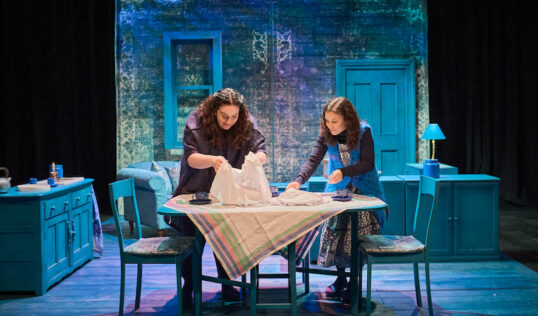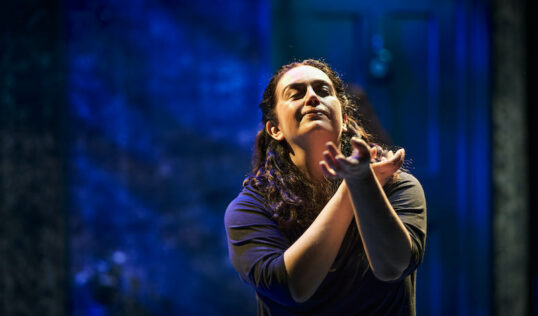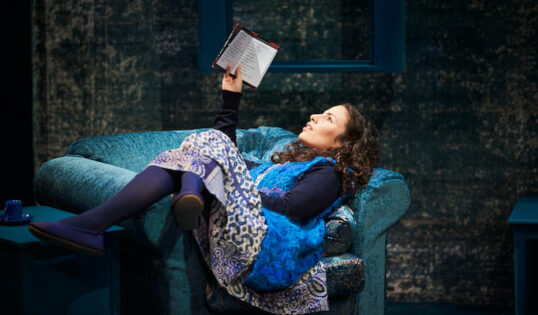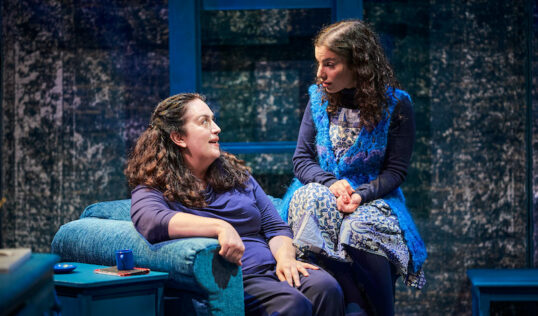Sister Radio
★★★★☆ Silence speaks
Traverse: Thurs 10 November 2022
Review by Tom Ralphs
Sister Radio arrives at the Traverse at the same time as anti-government protests in Iran, triggered by the death of a 22 year old woman arrested by Morality Police, enter their seventh week.
It adds context to Sara Shaarawi’s play for Stellar Quines and Pitlochry Festival Theatre, in a coproduction with Pearlfisher. One that echoes back to the Islamic revolution in this tale of two sisters who have shared the same Edinburgh flat for 43 years.
The sisters, Fatemah (Lanna Joffrey) and Shirin (Nalân Burgess), have not spoken to each other for the most of the time they have lived together.
The stasis in their life is immediately established by Becky Minto’s set and costume design. The basic blue furnishings of their flat suggest little has altered since Shirin first came to live with her sister, and their clothes equally blend into the background. While Shirin’s dress reflects her Persian roots, both of their choices reflect comfort rather than fashion.
fractured
Yet there is no comfort to be found in the flat. The sisters go through joyless routines, cooking, reading coffee grains and listening to the radio.
It is only when the play goes back in time that we hear them speak to each other. Even then, the sense is of a relationship that was already fractured and waiting for the event that would inevitably break it. Their responses to what was happening in their country at the time lie at the heart of their differing personalities. Shirin is more passionate and engaged with what is happening, while Fatemah is more conservative and disengaged from a country she has left behind.
Burgess and Joffrey cover the range of years and emotions their characters go through with ease, capturing the subtle changes as well as the fixed points in them individually and collectively.
The strength of Shaarawi’s characterisation is shown in how the personal and the political are so intertwined in both of the sister’s identities. They don’t need to talk about Tehran to show how the country shaped them, and their contrasting approaches show how events are the catalyst rather than the cause of the initial stresses between them.
With dialogue at a minimum and lengthy scenes where neither speaks, there is a heavy emphasis on music and movement to deliver meaning. The songs played on the radio span from John Lennon’s Happy Christmas, War is Over, through to Beethoven’s Fifth Symphony, via various hits from the Eighties and original compositions by Farzane Zamen.
The choices work perfectly in setting the time or mood as the play crosses between various years. The commentary on the radio performs a similar function as news headlines place us at a point in history, or their thoughts and past conversations are reflected back to them.
Movement Director Saffy Setohy turns the minutiae of daily routines into carefully choreographed studies that show the sisters together but apart, highlighting their dependency and isolation alongside the tragedy of a friendship that is so close and yet so out of reach. Towards the end of the play, the routines are played out against a soundtrack of several decades of headlines, creating a haunting image of time passing and nothing changing.
The feeling of stasis and lack of dramatic action created by director Caitlin Skinner is essential to establish the claustrophobia and loss that is at the play’s heart. It is added to by the play never showing us a time when the sister’s friendship was at its strongest. The radio station they invented and imagined in their childhood that is heard at the end of the play is the only sign we really get of this. This does however mean that the betrayal that triggered the death of the friendship is less enthralling than its consequences, partly because it feels almost inevitable.
The play builds to a subtle, understated close, that is all the more powerful and poignant because of it. The background of the Iran revolution may be an essential part of the context of the play, but the chords struck by its exploration of loneliness, betrayal and co-dependency go far beyond this.
Running time: One hour and 20 minutes (no interval)
Traverse Theatre, 10 Cambridge St, EH1 2ED
Thursday 10 – Saturday 12 November 2022
Evenings: 8pm; Sat mat: 2.30 pm.
Tickets and details: Book here.
Stellar Quines website: https://stellarquines.co.uk
Facebook: @StellarQuines
Twitter: @Stellarquines
ENDS






















